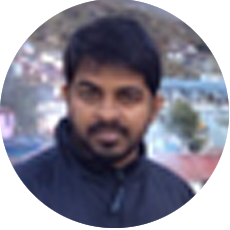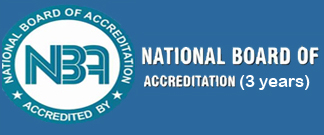

To be a department of excellence in quality education and research in the multidisciplinary areas of Biotechnology.


To imbibe the ability of critical thinking, scholastic attitude and provide solutions for critical problems
To embed acumen of life-long learning and zeal to pursue research in various disciplines of Biotechnology.
To nurture the ability to create sustainable solutions with a blend of socio-ethical understanding.
The Department of Biotechnology, is one of the vibrant departments at Kalasalalingam University. The B.Tech.- Biotechnology has been accredited by NBA as well as ABET. The B.Tech programme in Biotechnology offered by the Department of Biotechnology is fully tailored as per the needs of the biotechnology industry and current trend of research. The course also prepares the ground for graduates to pursue a higher degree in biotechnology, either in India or abroad. Students who want to go straight into a research programme will be able to do so because they will have acquired all of the necessary functional, theoretical and practical skills. The department regularly organizes conferences, seminars, guest lectures, workshops, symposiums and training programmes to maximise the impact of classroom education. Students are encouraged to engage in symposia and conferences in addition to their usual academic activities. Many prizes have been awarded to the students in the B.Tech.- Biotechnology programme in paper presentations and academic quiz competitions held in various colleges. Students are encouraged to participate in the department’s ongoing research activities.
Every year, the students of B.Tech.- Biotechnology programmes are selected for prestigious National Academy of Sciences summer fellowships, and many have spent their summers training in premier laboratories in India. The department of Biotechnology has 194 publications under their name(2014- present). The department has five separate teaching laboratories as well as a centralised instrumentation facility that houses advanced equipment for both students and faculty. Fermentor, thermocycler, gel-documentation system, deep Freeze, liquid Chromatography system, Sonicator, UV-VIS Spectrophotometer, ultrafiltration unit, and microplate readers are among the equipment available at the facility.
The main goal of the department is to make sure that the graduates of the B.Tech.-Biotechnology programme are able to achieve a general level of competence in order to undertake advanced courses and/or obtain specific training and skills applicable to their chosen career. The B.Tech graduates accept the responsible roles in academia, industry, and law in order to contribute to society and also demonstrate strong managerial skills, as well as a desire to learn and update themselves on a continuous basis. Our programme puts a focus on hands-on teaching. The department has six separate teaching laboratories such as: Microbiology and Cell Biology, Biochemistry, Chemical Engineering, Molecular Biology and Genetic Engineering, Bioprocess Technology, Immunology, Biochemical Engineering and Downstream Processing to hold practical sessions.
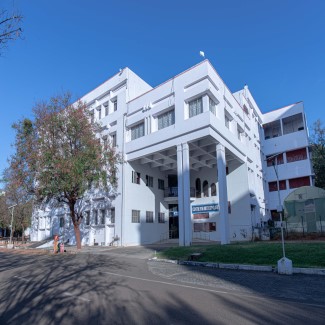
Materials Lab
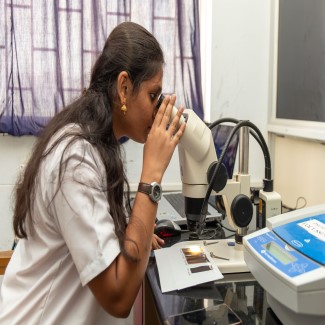
Labs
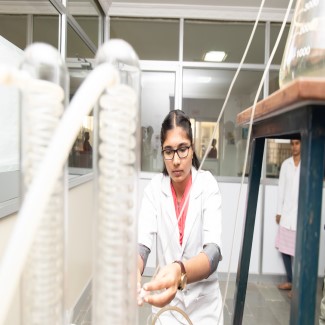
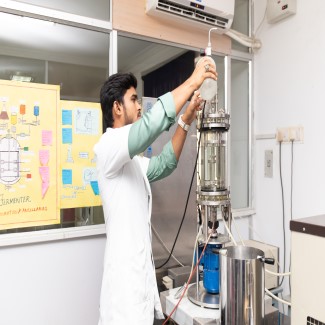
Labs
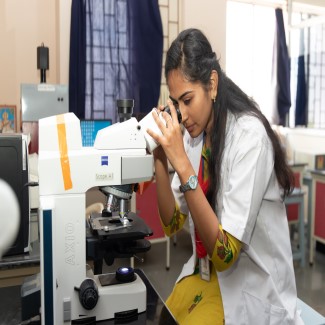
Labs
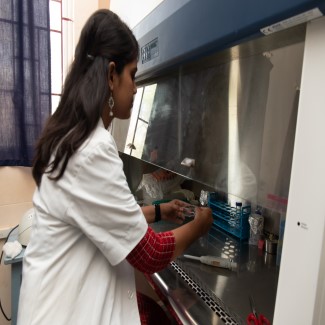
Labs
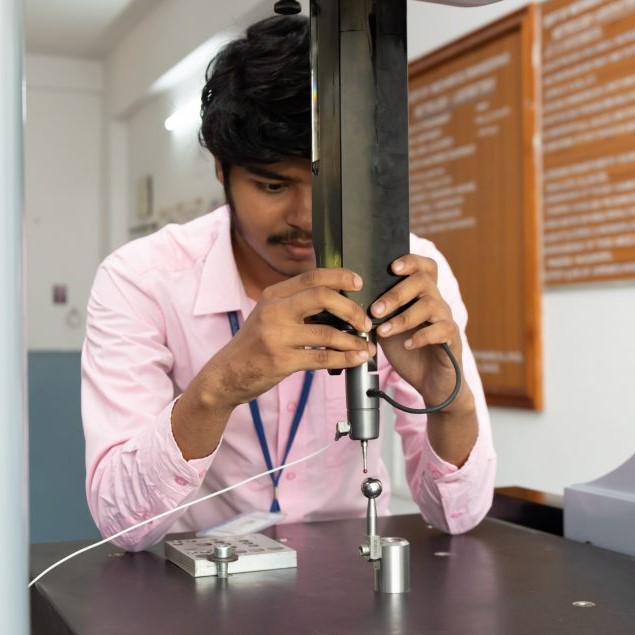
Labs
Program Educational Objectives (PEO)
The graduates of B Tech (Biotechnology) are expected to have:
PEO1 – Graduates will attain a general level of competence in order to pursue advanced courses and / or acquire specialized training and skills relevant to their professions.
PEO2 – Graduates will be engineering practitioners and leaders in public and private sector undertakings, who would help solve industry’s technological problems and serve our society.
PEO3 – Graduates will learn to uphold ethical conduct in their professions, have effective communication skills, and an affinity towards lifelong learning.
Program Outcomes (PO)
Engineering Graduates will be able to:
1. Engineering knowledge: Apply the knowledge of mathematics, science, engineering fundamentals, and an engineering specialization to the solution of complex engineering problems.
2. Problem analysis: Identify, formulate, review research literature, and analyze complex engineering problems reaching substantiated conclusions using first principles of mathematics, natural sciences, and engineering sciences.
3. Design/development of solutions: Design solutions for complex engineering problems and design system components or processes that meet the specified needs with appropriate consideration for the public health and safety, and the cultural, societal, and environmental considerations.
4. Conduct investigations of complex problems: Use research-based knowledge and research methods including design of experiments, analysis and interpretation of data, and synthesis of the information to provide valid conclusions.
5. Modern tool usage: Create, select, and apply appropriate techniques, resources, and modern engineering and IT tools including prediction and modelling to complex engineering activities with an understanding of the limitations.
6. The engineer and society: Apply reasoning informed by the contextual knowledge to assess societal, health, safety, legal and cultural issues and the consequent responsibilities relevant to the professional engineering practice.
7. Environment and sustainability: Understand the impact of the professional engineering solutions in societal and environmental contexts, and demonstrate the knowledge of, and need for sustainable development.
8. Ethics: Apply ethical principles and commit to professional ethics and responsibilities and norms of the engineering practice.
9. Individual and team work: Function effectively as an individual, and as a member or leader in diverse teams, and in multidisciplinary settings.
10. Communication: Communicate effectively on complex engineering activities with the engineering community and with society at large, such as, being able to comprehend and write effective reports and design documentation, make effective presentations, and give and receive clear instructions.
11. Project management and finance: Demonstrate knowledge and understanding of the engineering and management principles and apply these to one’s own work, as a member and leader in a team, to manage projects and in multidisciplinary environments.
12. Life-long learning: Recognize the need for, and have the preparation and ability to engage in independent and life-long learning in the broadest context of technological change.
Program Specific Outcomes (PSOs)
PSO1: Identify and analyze the problems related to biopharmaceutical production, agriculturalproduction and bioinformatics, and develop solutions to these through appropriate methods,aided by their knowledge of engineering.
PSO2: Apply their knowledge for the investigation of complex problems in themanufacture of biological products; and in the prevention, diagnosis and treatment ofdiseases, using cutting–edge technologies, to promote the health and well–being of society.
PSO3: Recognize the need for a clean environment and optimize the use of natural resources for sustainability, either individually or as a team, governed by ethical considerations.
RESEARCH ACTIVITIES
The department of Biotechnology has 194 publications under their name. In addition, the department has a 1000-square-foot research laboratory, as well as a state-of-the-art animal cell-culture facility and a Proteomics facility. These facilities include an inverted microscope, laminar air-flow system, CO2 incubator, and 2D electrophoresis systems, as well as all of the basic instruments needed for culturing animal cells. The Department of Biotechnology employs accomplished and well-trained faculty to teach students about this specialised area. Our faculty members have a wide range of research interests. They have received their education at prestigious institutions in India and abroad, and a few of them have held senior positions in biotechnology and pharmaceutical firms. The department’s faculty members are actively engaged in research and have more than 10 ongoing projects sponsored projects by DST,DBT,ICMR etc worth INR 3 Crore.






























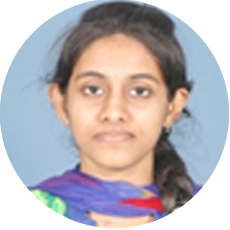
I feel glad of choosing biotechnology as my main stream in Kalasalingam Academy of Research and Education. The department is marvellous, equipped with all sophisticated instrument which help the students to enrich and enlighten their practical knowledge and theory classes. The professors are very humble, friendly and very dedicated towards their work always help students to come out with flying colours. The paradigm of curriculum designed by the university is appreciative, it always tends to push the students to one step ahead in their life and help feeble person to become sagacious one. The infrastructure is magnificent with pleasant and relaxing atmosphere. Many opportunities are being provided to scrutinise and rejuvenate the career of the student.
C. BHAVISHYA (2015 – 2019), Masters Programm – McGill University, Canada

